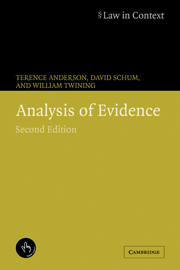Book contents
- Frontmatter
- Contents
- Preface
- Acknowledgments
- Tables of cases and statutes
- Table of legislation and rules
- List of abbreviations
- 1 Evidence and inference: some food for thought
- 2 Fact investigation and the nature of evidence
- 3 Principles of proof
- 4 Methods of analysis
- 5 The chart method
- 6 Outlines, chronologies, and narrative
- 7 Analyzing the decided case: anatomy of a cause célèbre
- 8 Evaluating evidence
- 9 Probabilities, weight, and probative force
- 10 Necessary but dangerous: generalizations and stories in argumentation about facts
- 11 The principles of proof and the law of evidence
- 12 The trial lawyer's standpoint
- Glossary of terms and symbols
- References
- Index
1 - Evidence and inference: some food for thought
Published online by Cambridge University Press: 23 November 2009
- Frontmatter
- Contents
- Preface
- Acknowledgments
- Tables of cases and statutes
- Table of legislation and rules
- List of abbreviations
- 1 Evidence and inference: some food for thought
- 2 Fact investigation and the nature of evidence
- 3 Principles of proof
- 4 Methods of analysis
- 5 The chart method
- 6 Outlines, chronologies, and narrative
- 7 Analyzing the decided case: anatomy of a cause célèbre
- 8 Evaluating evidence
- 9 Probabilities, weight, and probative force
- 10 Necessary but dangerous: generalizations and stories in argumentation about facts
- 11 The principles of proof and the law of evidence
- 12 The trial lawyer's standpoint
- Glossary of terms and symbols
- References
- Index
Summary
Introduction
The field of evidence is no other than the field of knowledge. (Bentham, An Introductory View, Chapter 1)
Evidence is the basis of justice: exclude evidence, you exclude justice. (Bentham, Rationale of Judicial Evidence, Part III, Chapter 1)
In this chapter we present some concrete examples and exercises that introduce the main questions and the basic concepts that are involved in analyzing evidence. The purpose of presenting them at this stage is partly to stimulate interest and puzzlement and partly to encourage you to start to think actively about some basic issues. We use many of the examples and exercises presented here to illustrate points developed later in the book.
The examples in part B raise questions about the similarities and differences involved in confronting problems of evidence and inference in different non-legal contexts, including bible stories, intelligence analysis, famous “analysts,” and commonplace events. Each develops variations around the central theme that the kind of reasoning involved in all these different kinds of factual enquiries is based on the same underlying principles that apply differently as the contexts and standpoints vary.
The examples in part C illustrate the same central theme using examples from legal contexts. The first four examples introduce the process of imaginative reasoning and the roles that generalizations and stories play in arguments about disputed questions of fact. The remaining examples involve cases of increasing complexity that focus upon the kinds of analysis required at different stages of criminal and civil cases and raise issues about the relationship between law and fact, standards of proof, and inferential reasoning in both kinds of cases.
- Type
- Chapter
- Information
- Analysis of Evidence , pp. 1 - 45Publisher: Cambridge University PressPrint publication year: 2005



